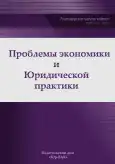Sustainable Corporate Governance: Problems and Contradictions of Implementation in Conditions of Instability
- Authors: Petrova A.V.1
-
Affiliations:
- Gazprom Social Initiatives Foundation
- Issue: Vol 18, No 6 (2022)
- Pages: 95-101
- Section: Articles
- URL: https://journal-vniispk.ru/2541-8025/article/view/147296
- ID: 147296
Cite item
Abstract
Corporate governance is regulated by civil (corporate) legislation, and the achievement of the SDGs and the implementation of the ESG agenda are ensured mainly by soft regulation: international (GRI) and national standards, focused mainly on the formalization of activities, the preparation of relevant reports, while real results are difficult to assess due to the lack of relevant data and techniques. Uncertainty hinders law formation, which cannot reveal the state of existing relations and law-making, which cannot rely on an adequate and objective analysis of the state of relations in the field of sustainable corporate governance in order to identify the need for their regulation. Traditional for the last decades use of foreign experience (reception, adaptation) is significantly hampered by the current escalation of international tension. The current soft norms and GRI Standards, which allow reporting on the implementation of the SDGs and ESG, are evaluative in nature, difficult to verify and do not provide for liability for their distortion. In the current conditions of the extreme complexity of the functioning of the economy, the priorities of «real», financial indicators inevitably push aside «abstract» indicators of the impact on the environment and society. In the aggregate, in the medium term, the legal model of corporate governance will continue to be based on the current and improved corporate legislation, while the achievement of the SDGs and ESG will remain in the soft regulation sector.
About the authors
Alina V. Petrova
Gazprom Social Initiatives Foundation
Email: petrova.av@socialfondgaz.ru
Deputy Director Moscow, Russian Federation
References
- PRI Association (Principles for Responsible Investment, PRI) UNPRI https://www.unpri.org/.
- Basic performance indicators. Recommendations for use in management practice and corporate non-financial reporting / F.Prokopov, E. Feoktistova and others; Edited by A. Shokhin. M.: RSPP, 2008. 68 p.
- Bank of Russia https://cbr.ru/StaticHtml/File/117620/20210712_in-06-28_49.pdf.
- Borzakov D. Evolution of guidelines and standards of the Global Reporting initiative on reporting in the field of sustainable development// Region: systems, economics, management / 2022. №1 (56). p. 85-92.
- BoyarovA. Tools of corporate governance: corporate social responsibility and sustainable development of the company// Russian entrepreneurship / 2009. №7-1. p. 41-45.
- KPMG Bulletin №3, 2013г. http://www.kpmg.com/RU/ru/IssuesAndInsights/ArticlesPublications/In-focus-corporate-governance-sustainbility/Pages/GS-MagazineJanuary2013.aspx.
- The UN Global Compact for the Development of a Methodological framework for Responsible Investment as an activity that promotes the reorientation of Capital Flows to Finance Sustainable development (https://www.un.org/ru/our-work/support-sustainable-development-and-climate-action).
- Global Reporting Initiative, GRI https://www.globalreporting.org/.
- United Nations (UN) Global Compact) https://www.unglobalcompact.org/.
- Declaration «Transforming our World: the 2030 Agenda for Sustainable Development», adopted by the UN General Assembly resolution of September 25, 2015. https://unctad.org/system/files/official-document/ares70d1_ru.pdf.
- Our Common Future / Brundtland Report. United Nations World Commission on Environment and Development, 1987.
- ESG issues in the practice of Russian public companies // Russian Institute of Directors, 2021. https://nokc.org.ru/wp-content/uploads/2021/05/issledovanie.-esg.pdf.
- ESG transformation: Russia is at the very beginning of the «green» path// HSE. 2021. April 21 https://www.hse.ru/news/expertise/463394013.html.
- Emets M. Corporate governance as an ESG factor and profitability of shares of Russian companies// Economic security/ 2021. Vol. 4. № 2. p. 421-432.
- Information letter on recommendations on disclosure by public joint stock companies of non-financial information related to the activities of such companies dated 12.07.2021 No. IN-06-28/49/ Bank of Russia https://cbr.ru/StaticHtml/File/117620/20210712_in-06-28_49.pdf.
- Information Letters of the Bank of Russia dated 15.07.2020 No. IN-06-28/111 «On recommendations on the implementation of the Principles of Responsible investment» and (for PJSC) dated 12.07.2021 No. IN-06-28/49 «On recommendations on disclosure by public Joint Stock companies of non-financial information related to the activities of such companies» / https://cbr.ru/StaticHtml/File/117620/20210712_in-06-28_49.pdf.
- Manaykina E. Project management in the company taking into account the principles of the concept of sustainable development: dissertation of the Candidate of Economic Sciences. 08.00.05. / M., 2015.
- The International Integrated Reporting Council, IIRC https://www.integratedreporting.org/.
- Adopted by the 21st session of the Conference of the Parties to the UN Framework Convention on Climate Change. Signed on behalf of the Russian Federation in New York on April 22, 2016/ UN https://www.un.org/ru/climatechange/paris-agreement.
- GRI Sustainability Reporting Standards // globalreporting URL: https://www.globalreporting.org/information/sustainability-reporting/Pages/gri-standards.aspx (дата обращения: 10.06.2020).
- United Nations Environment Programme Finance Initiative (UNEP FI) UNEP FI https://www.unepfi.org/.
- Cardoni, A., Kiseleva, E., & Lombardi, R. A Sustainable Governance Model to Prevent Corporate Corruption: Integrating Anticorruption Practices, Corporate Strategy and Business Processes// Business Strategy and the Environment. 2020. №29 (3), 1173-1185. https://doi.org/10.1002/bse.2424.
- Corporate Register. Доступно: https:// www.corporateregister.com.
- Horton, Cole; Jessop, Simon Positive ESG performance improves returns globally, research shows. Reuters. 28 July 2022/ https://www.reuters.com/business/sustainable-business/positive-esg-performance-improves-returns-globally-research-shows-2022-07-28/.
- Reporting Exchange. Доступно: https:// www.reportingexchange.com.
- Reporting matters // WBCSD, 2020. Доступно: https://docs.wbcsd.org/2020/10/WBCSD_ Reporting_Matters_2020.pdf.
- The time has come. Survey of Sustainability Reporting // KPMG, 2020. Доступно: https://assets. kpmg/content/dam/kpmg/xx/pdf/2020/11/the-time-has-come.pdf.
- Highlights: GRI at 20// Global Reporting Initiative. https://www.globalreporting.
- Sytse Douma, Hein Schreuder Economic Approaches to Organizations, 5th edition. Сh. 15, London: Pearson, 2013.
- UNPRI https://www.unpri.org/pri/about-the-pri.
Supplementary files








